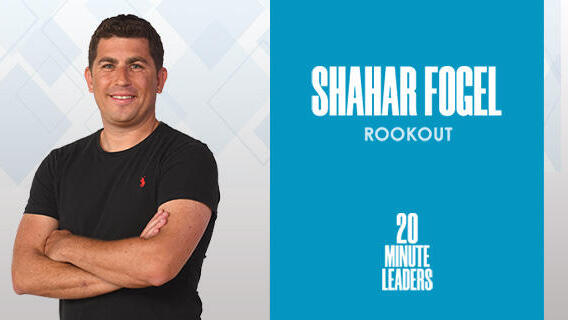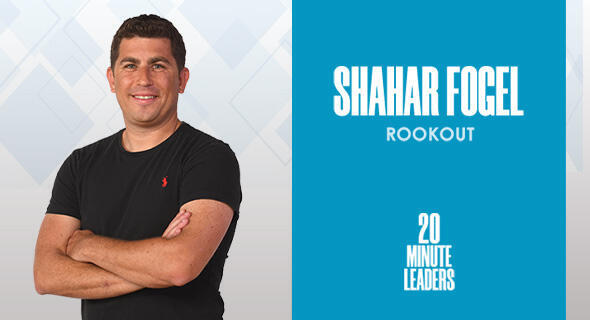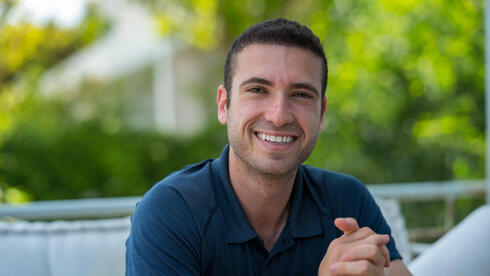
20-Minute Leaders
“We want to see a paradigm shift in the way that engineers are working.”
Software engineers spend too much time finding and solving issues rather than building the features that bring value, says Shahar Fogel, CEO of Rookout.
Software engineers spend too much time finding and solving issues rather than building the features that bring value, says Shahar Fogel, CEO of Rookout. He has a vision to change the way engineers work so that they can focus on delivering value to their company and customers. Rookout allows developers to get data on their application with a single click to find and fix bugs quickly. Fogel says the iteration process to debug software has been a pain point for many years, but because there wasn’t a solution, people aren’t looking for one. He shares that market education is very important for Rookout. Even though the product solves a huge problem, he says that go-to market is always difficult for any company. Before Fogel joined Rookout, he spent time in VC and product positions in Europe. But he says his roles as dad and husband are what truly define him.
Click Here For More 20MinuteLeaders
Before I ask what you are doing with Rookout, I have to ask how you've experienced Roger Federer's departure.
That was like a week of Shiva for me. It was very, very depressing. I'm a big, big tennis fan. I've been playing tennis since—I can't remember when. I'm a big Roger Federer fan. My dog is named Roger. Three of my kids were born in Switzerland. So we have strong bonds.
Tell me about your own journey leading up to Rookout.
Before my career, I'm married; I have four kids. That's always what defines me, as a family person. But besides that, I started my career in the Israeli Intelligence Forces as a software engineer. I spent around a decade in the service doing mainly cybersecurity work. I was a software engineer, a team lead, department head. That gave me the foundations of what it takes to build software, to manage software engineering, and all of that.
Afterwards, I moved to the UK. I did an MBA at Cambridge University. Then I moved to Switzerland. I started as a principal in a VC fund doing mainly early-stage investments and seed, A-rounds around enterprise software. After a few years in the VC space, I moved back to the real world, the operational world. I was a VP product in a couple of European companies. I came back to Israel five years ago. I joined Rookout three years ago as its CEO.
What is the common thread between all these different activities and positions that will help me get a better picture of who Shahar is?
What defines me in my career is that I like to do lots of things that basically take technology on one end and some kind of an impact. It could be business impact. Before, it was national security impact. But basically, what's the meaning of building the stuff that we are building and constantly trying to find the common ground.
Explain to me about the problem space that you are in with Rookout because this is a problem that I've experienced myself.
The problem that Rookout solves is the ability to give engineers the power to bring the data they need in a click of a button. We want to make decisions based on data. For engineers, this data is how their application is behaving: logs, metrics, traces, line by line the behavior of the software. That's the debugging process or the behavior process of the application.
Up until Rookout, the only way to understand what's going on is to add log lines, meaning writing more code and then releasing a version of the software, starting to get the data back from the software, and understanding if you've placed it in the right location. If not, the whole iteration again and again and again until you understand what the hell is going on.
When we look at engineers’ time, around 60, 70% of the time is to solve issues. Only 30, 40% of the time is actually writing the features that deliver value to the organization. We want engineers to focus on delivering value and spend less time on debugging and understanding and fixing issues. What we give them is the ability to take processes that today take them 20 minutes or two hours or five days or a couple of weeks and do it in a click of a button. Click that button, get the data you need, even for production. In the cloud native world where everything is distributed and containerized, the debugging problem is only amplified. It's only more difficult because the software is further away from you.
This is a problem that we've been experiencing for 30, 40 years. The way that I'm debugging generally last year was the same way that I debugged 15 years ago, at least for me. Why hasn't this been resolved before Rookout came?
The plain answer is every big idea was the first one to come. But specifically, what we do is we take something that is very relevant to the cyber world of how we do what we do, which is by code instrumentation, very low-level work, and apply it to the development world. So the ability to click a button, instrument the code in a live manner without predefining anything and just getting the data from that instance is a skillset. The way we do it is very much similar to how cyber tools work. It's a very difficult technological problem and a challenge. It took us a while to bring it to a state where it's stable enough and it doesn't impact security and performance.
I can't imagine that go-to market is the most significant challenge here, right? How are you experiencing the market education and the go-to market at this point?
I know many great companies who have great technology: go-to market is always the issue. It's always a challenge in any domain, in any industry, and for every product. And for us as well.
Market education is a key challenge in what we are trying to achieve because it just didn't exist before Rookout. When you go to an engineer and you show them what we do, there is always like the jaw dropping, "Aha, how did it not exist until now?" Which means that people are not actively searching for a solution like that because they don't know it exists. So we need to educate the market that the solution exists for them to use it.
Now, in terms of the go-to market strategy, it's a combination. It's a combination of bottom-up, product led growth momentum, of course: that's kind of how engineers operate and work. But on the flip side, our aim is to sell to large organizations. Eventually, our solution is an agent which is going and sitting in production, in a data-sensitive environment. For the individual engineer, it is very difficult for him to go into one of the top three banks in the US and put an agent in production for their trading system, so you have to go through the process anyways.
Take me three, five years down the line, what is your vision for Rookout?
The north star for us is the world of observability. Lots of these companies are targeted at ops people. For Rookout, we are leading the developer-first observability approach as part of the "shift left" motion in the world where engineers are getting more accountability, responsibility, and ownership of the application. They need to understand what's going on without calling their friend from ops. We want to give engineers the tools to understand what's going on in a click of a button and to be a part of their day-to-day tool set.
Five years from now, I want every engineer to say, "How did we live without the ability to instrument the code in a live manner?"
If you are looking today at how you are measuring the success of your own product, what is the key matrix that you really care about?
For investors, for a company, eventually, we are a business. It's all about how much our people are paying us to use the product. For us, how we are measuring it is, of course, by adoption within the organization and not only how many users but how much are they using us? If they are using us in the day to day as part of the software development life cycle. How much are we embedded into their process? At the end of the road, when we are talking to our clients, we want to see a paradigm shift in the way that engineers are working. It's that big basically.
Michael Matias, Forbes 30 Under 30, is a Venture Fellow at Innovation Endeavors as well as investment Venture Partner at Secret Chord and J-Ventures. He studies Artificial Intelligence and Human-Computer Interaction at Stanford University, and was an engineer at Hippo Insurance. Matias previously served as an officer in the 8200 unit. 20MinuteLeaders is a tech entrepreneurship interview series featuring one-on-one interviews with fascinating founders, innovators and thought leaders sharing their journeys and experiences.
Contributing editors: Michael Matias, Megan Ryan

